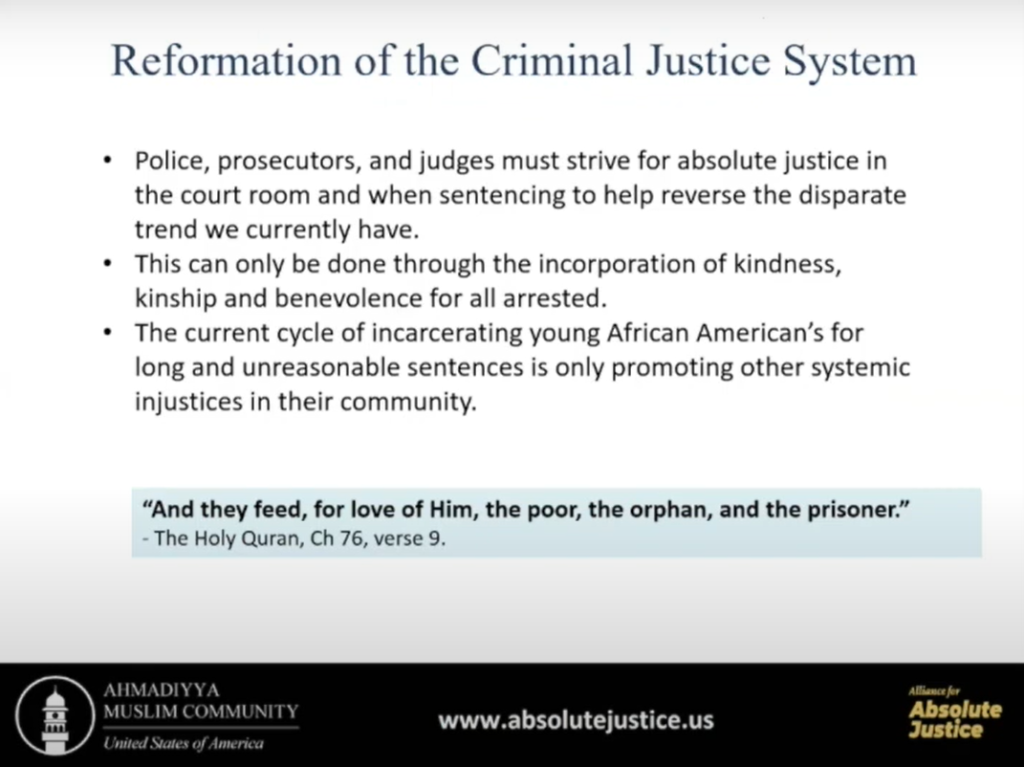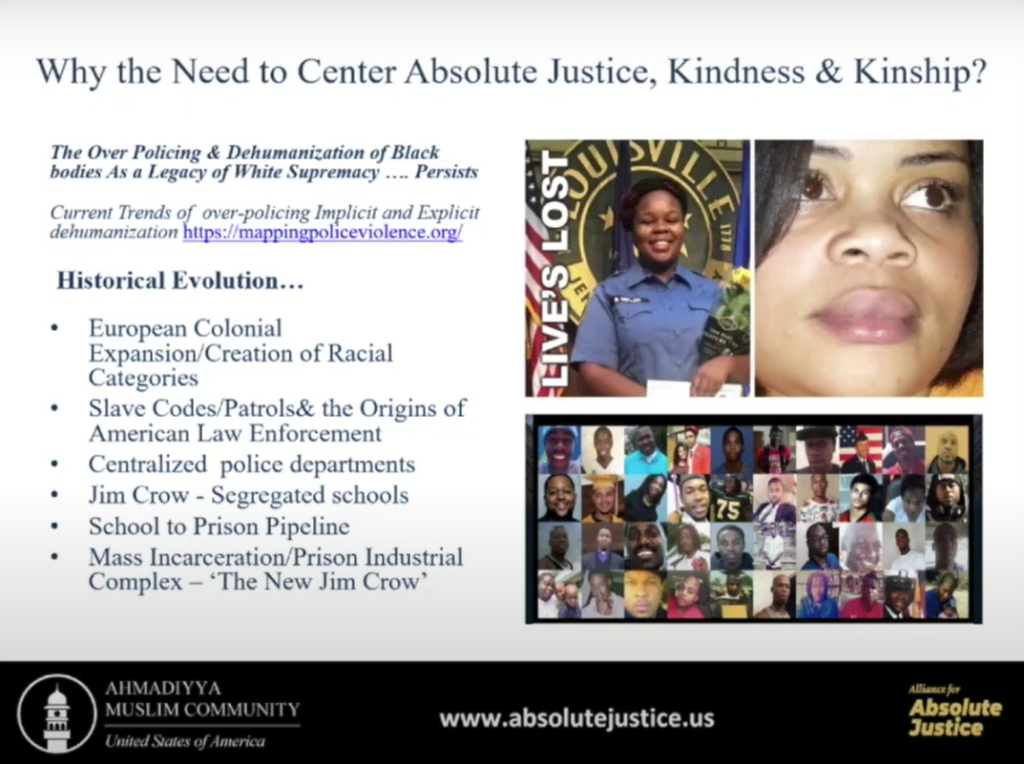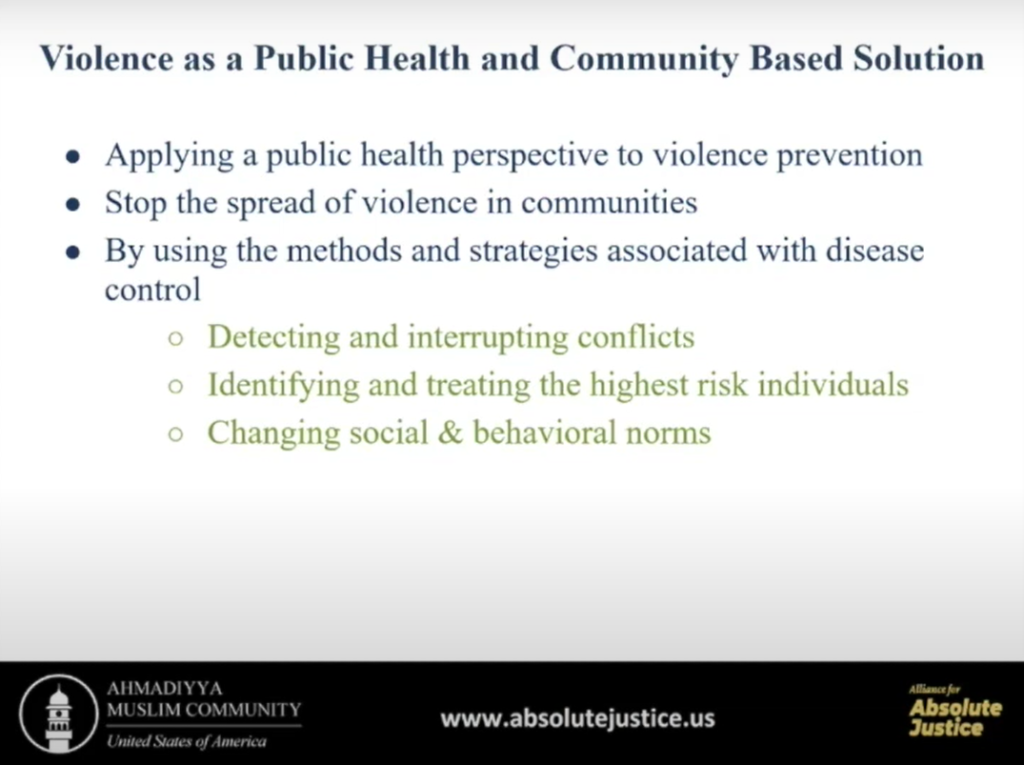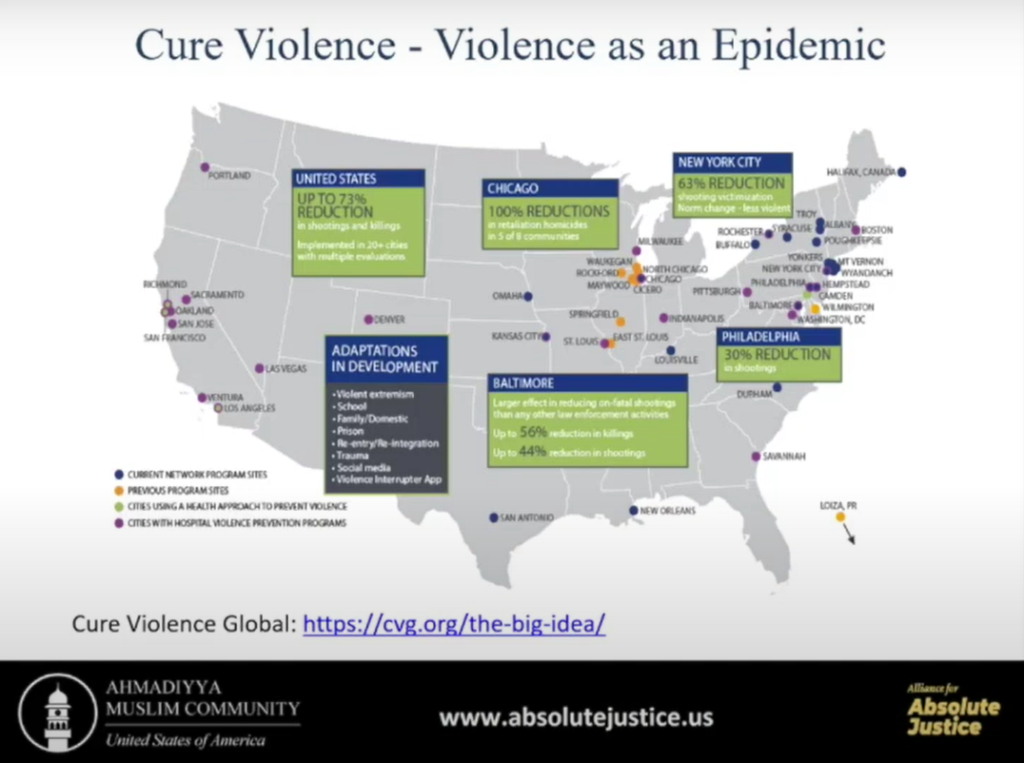Ahmadiyya Muslim Community Leads Session at 23rd Pittsburgh Racial Justice Summit
Alliance for Absolute Justice Draws Nearly 200 Participants and Experts
On January 23, 2021, the Ahmadiyya Muslim Community USA, in affiliation with its sister organization Alliance for Absolute Justice (AAJ), presented the special expert panel forum entitled “Absolute Justice, Kindness, and Kinship: A New Approach to Criminal Justice Reform,” as part of the 23rd Annual Pittsburgh Racial Justice Summit. Inspired by the book of the same name–Absolute Justice, Kindness and Kinship, written by the Fourth Caliph of the worldwide Ahmadiyya Muslim Community, Hadhrat Mirza Tahir Ahmad–the talk laid out an effective approach to reform criminal justice system through the lens of “kindness” and “kinship” alongside justice.
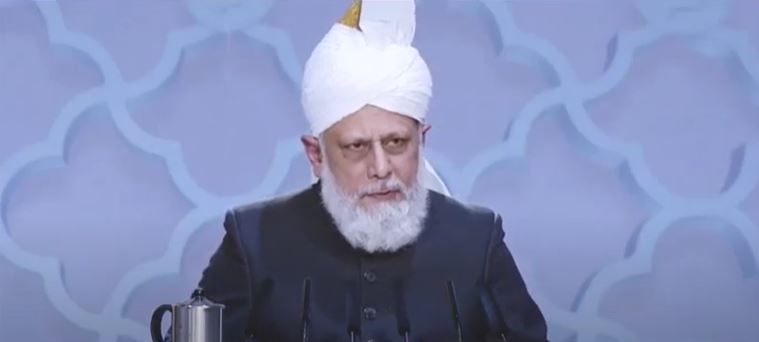
The session began with a short trailer of the Muslim Television Ahmadiyya (MTA) documentary The Golden Rule. In the clip, the current head of the worldwide Ahmadiyya Muslim Community, His Holiness Hadhrat Mirza Masroor Ahmad, provides a sobering reminder of the risk of a civil war if true justice and peace are not established. The video addresses recent racial tensions stemming in the United States and how the principle of the “Golden Rule” to treat others how we want to be treated ourselves is at the heart of any solution.
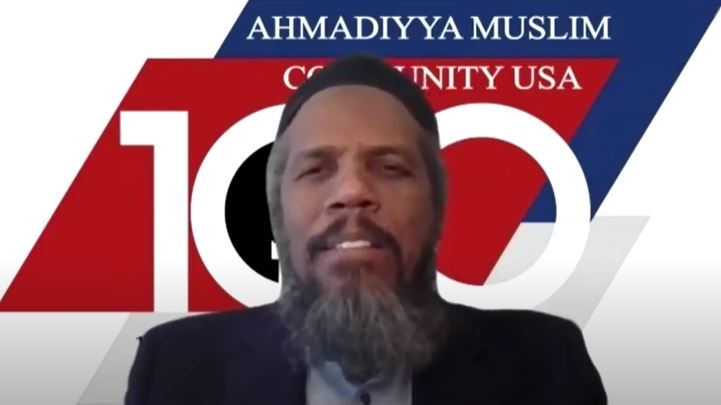

Imam Azhar Haneef outlined the ‘three degrees of justice’ which, together, lead to ‘absolute justice’. The first degree encompasses the Golden Rule — treat others as you want to be treated. This most basic concept of justice ought to apply to all aspects of human life. The second degree is not to reciprocate hatred with more hatred. And finally, the apical degree of justice mandates that we treat all creation with grace and benevolence. To Illustrate the third degree of absolute justice, the speakers referred to the relationship between a mother and her child and exhorted that the society must cultivate this quality to reform America’s criminal justice system. Imam Azhar Haneef reminded the audience of the horrors of Red Summer, a time when African Americans were beaten and lynched across the United States. He asked, “How can America promote democracy if it cannot protect the most vulnerable on its shores?” “If we had the spirit of a mother in us, then that injustice would cease to a major degree,” he added.
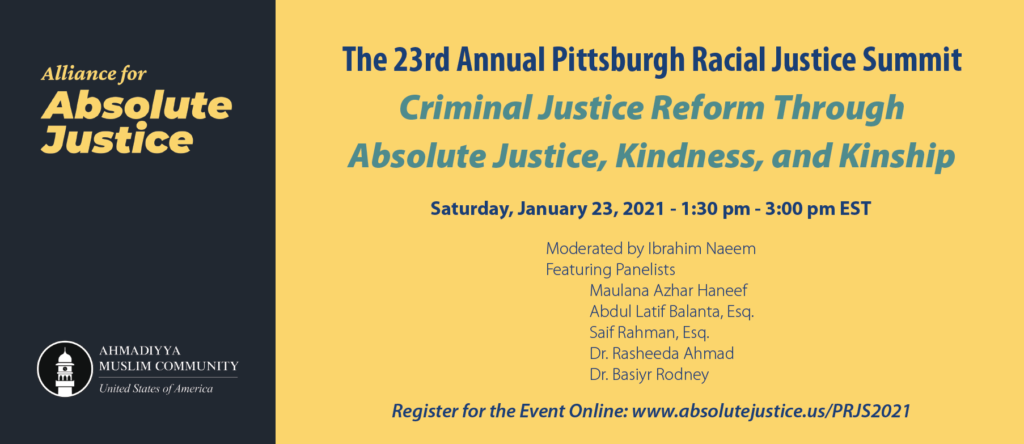

Abdul Lateef Balanta, a Civil Rights Legal Advisor in Baltimore, MD, then spoke about the need for bail reform at the pretrial detention level. He explained that approximately 746,000 prisoners are currently in the ‘jail system.’ The jail system includes all places where people are held before conviction or where some serve a short sentence. He pointed to a major issue that over a third of those that have a bail bond set on their trial cannot afford to pay it, which means that the poor are placed in jail before they can even see a judge. The idea of the presumption of innocence seems to only apply to those who can afford the bail, Attorney Balanta added. Unsurprisingly, pretrial detention disproportionately affects minorities and people of color. Attorney Balanta outlined several ways to reform the criminal justice system that profits off the innocence of the people. First, he proposed that low-level offences should be given a citation to avoid entering the legal system altogether. He then proposed that bonds should be offered based on defendants’ ties to their community and family. These factors can provide more of an insurance than bonds themselves and would deteriorate the profit incentive in which bondsmen make more money with more charges, Balanta explained.
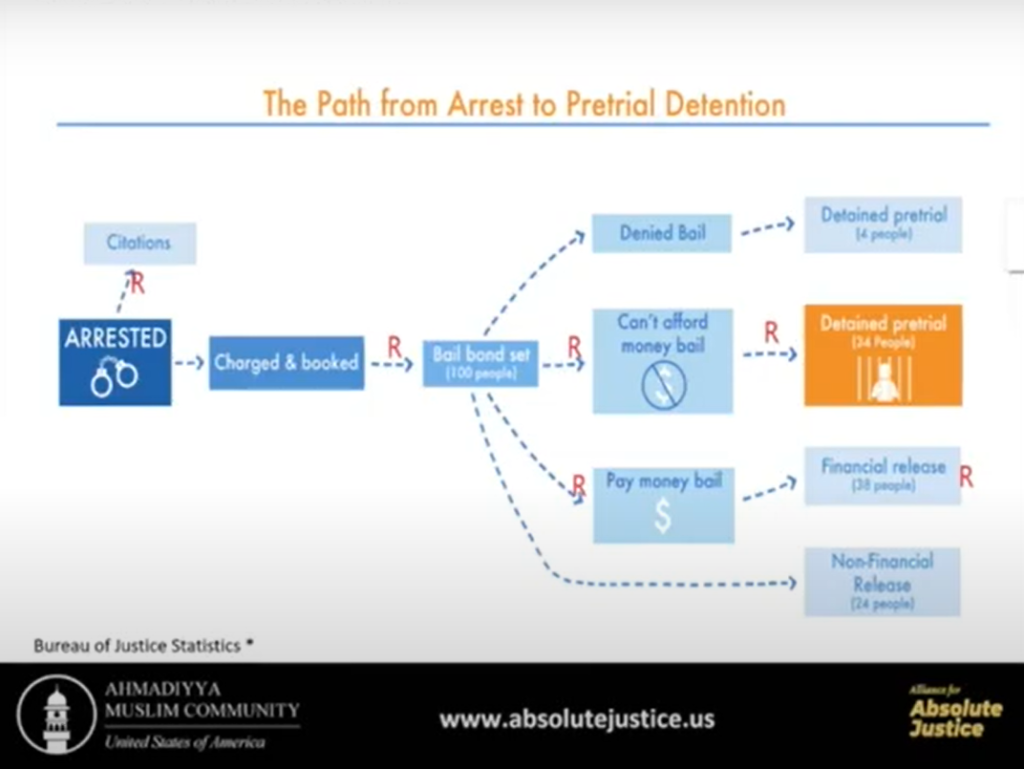

Following Attorney Balanta, Saif H. Rahman , a criminal defense lawyer (former public defender) with 15 years of experience practicing in Los Angeles, spoke on “The Criminal Punishment System.” Attorney Rahman explained that prosecutors must adhere to “absolute justice,” more so than any other group in the criminal justice system since they possess the power to punish or forgive based on their selection of charges pressed against an alleged wrongdoer. Rahman added that punishment through the justice system revolves around deterrence, incapacitation, rehabilitation, and retribution; however, too often retribution is the leading factor. Thus, to achieve a just society and stop the current cycle of incarceration, all law enforcement and other officials must apply kindness, kinship, and benevolence in their every interaction with offenders.
Dr. Rasheeda Ahmad, EdD, assistant professor of Education at Cabrini University, spoke on the topic of “Rationale for Centering Absolute Justice, Kindness, and Kinship in Criminal Justice Reform.” She stated that the current racial divisions of society are not something that existed earlier in history and asked the audience to ponder why this change occurred. Through historical analysis, Dr. Ahmad explained the long history of “over policing and dehumanization of black bodies [as] the legacy of white supremacy,” a legacy that persists today. She added that if the mentality [of white supremacy] is not broken, racial injustice will become more permanent and prevalent. She emphasized that to seek change, “justice alone is not enough, we need to add benevolence.” Only by implementing justice, kindness, and kinship with our free will can we reverse the centuries of dehumanization of black and brown communities.
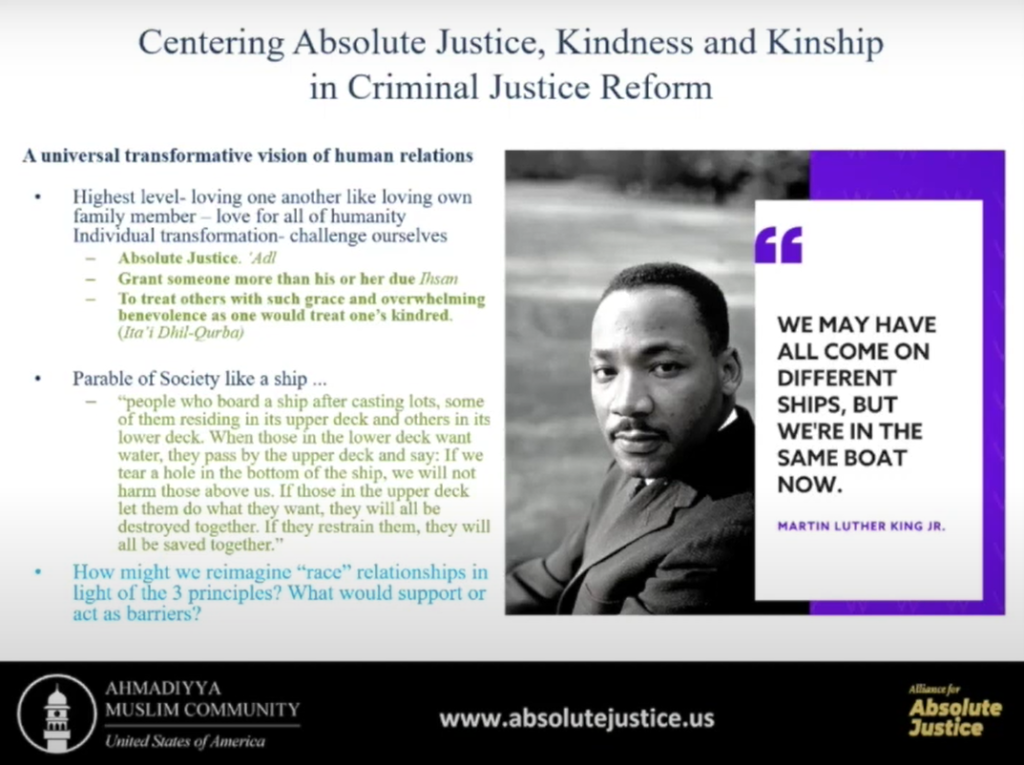

Finally, Dr. Basiyr Desmond Rodney, PhD, professor of Education at Webster University and President of the Pan-African Ahmadiyya Muslim Association, spoke about violence as a public health concern. Dr. Rodney asked the audience in what ways they were addressing racial injustice. He posited that now we must “deal with the pathology of violence” in order to stop it. Dr. Basiyr presented a thought-provoking framework for violence prevention based on public health that is the foundation of a participatory and communal model. This framework provides methods of detecting and interrupting conflicts, identifying high-risk individuals, and changing societal and behavioral norms. He further suggested that there are a number of ways to implement these changes where kindness and kinship are at the center to help stop the inevitability of violence and increase our communities’ overall well-being.
Towards the end, the panelists opened the floor to questions from the audience. Attorney Balanta encouraged all to read Absolute Justice, Kindness and Kinship to gain a better understanding of how to effectively act upon ‘Absolute Justice.’ The audience were reminded that in order to achieve this ideal, we ought to shift our focus from infringement on our rights to securing the rights of others. Through following these sacred teachings first taught by the Prophet Muhammad (peace and blessings be on him), we can get a step closer to achieving ‘Absolute Justice.’

